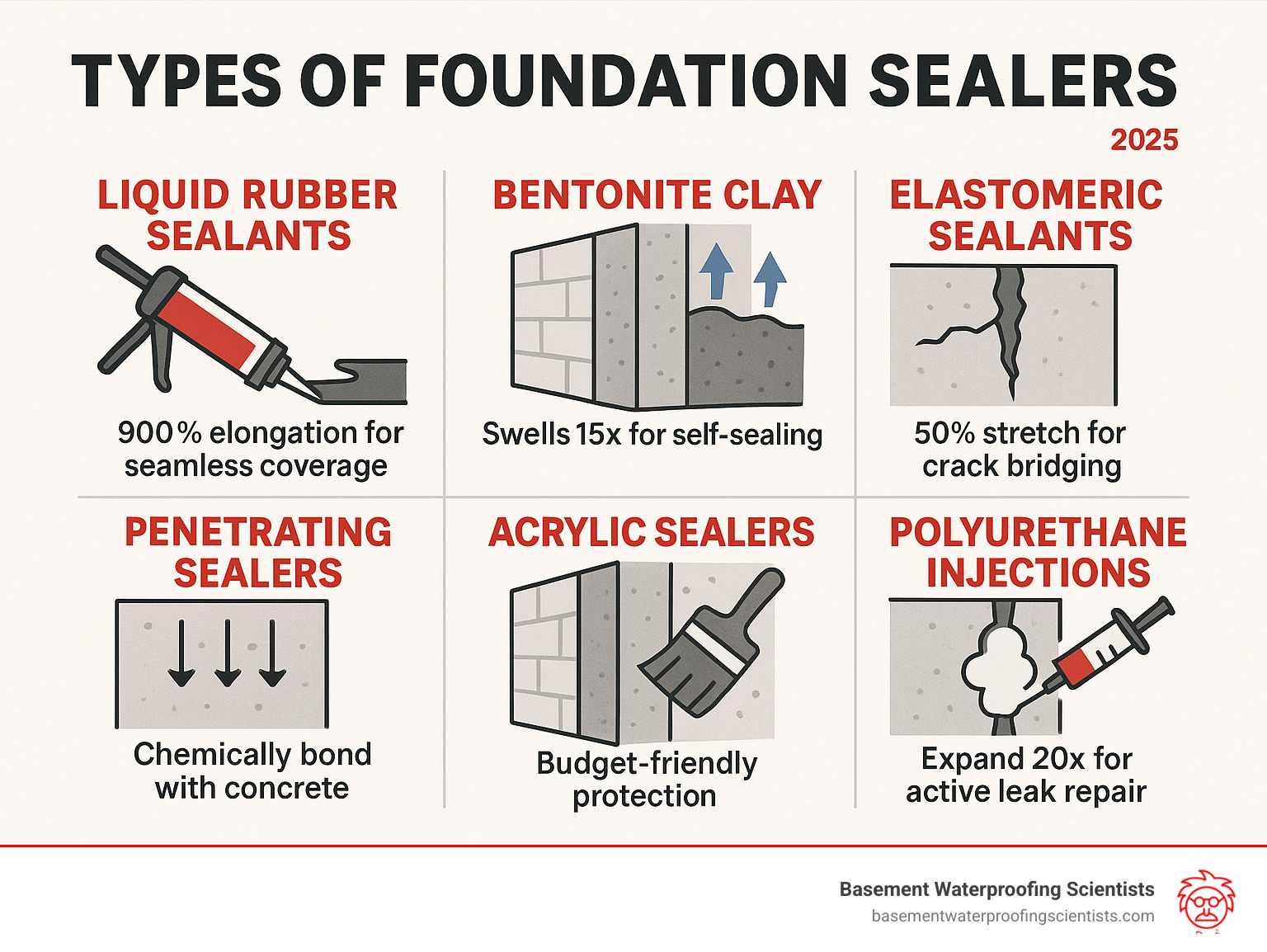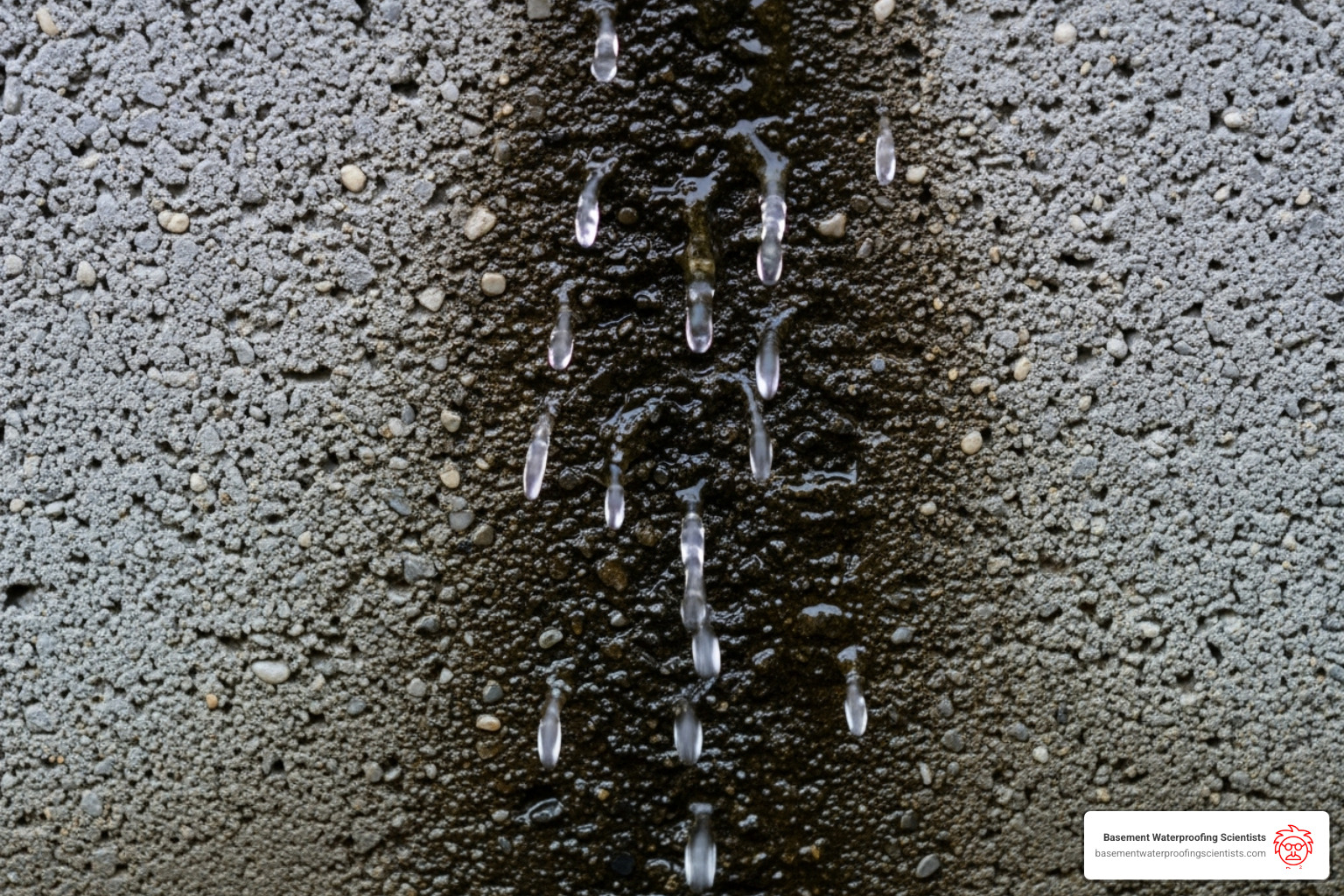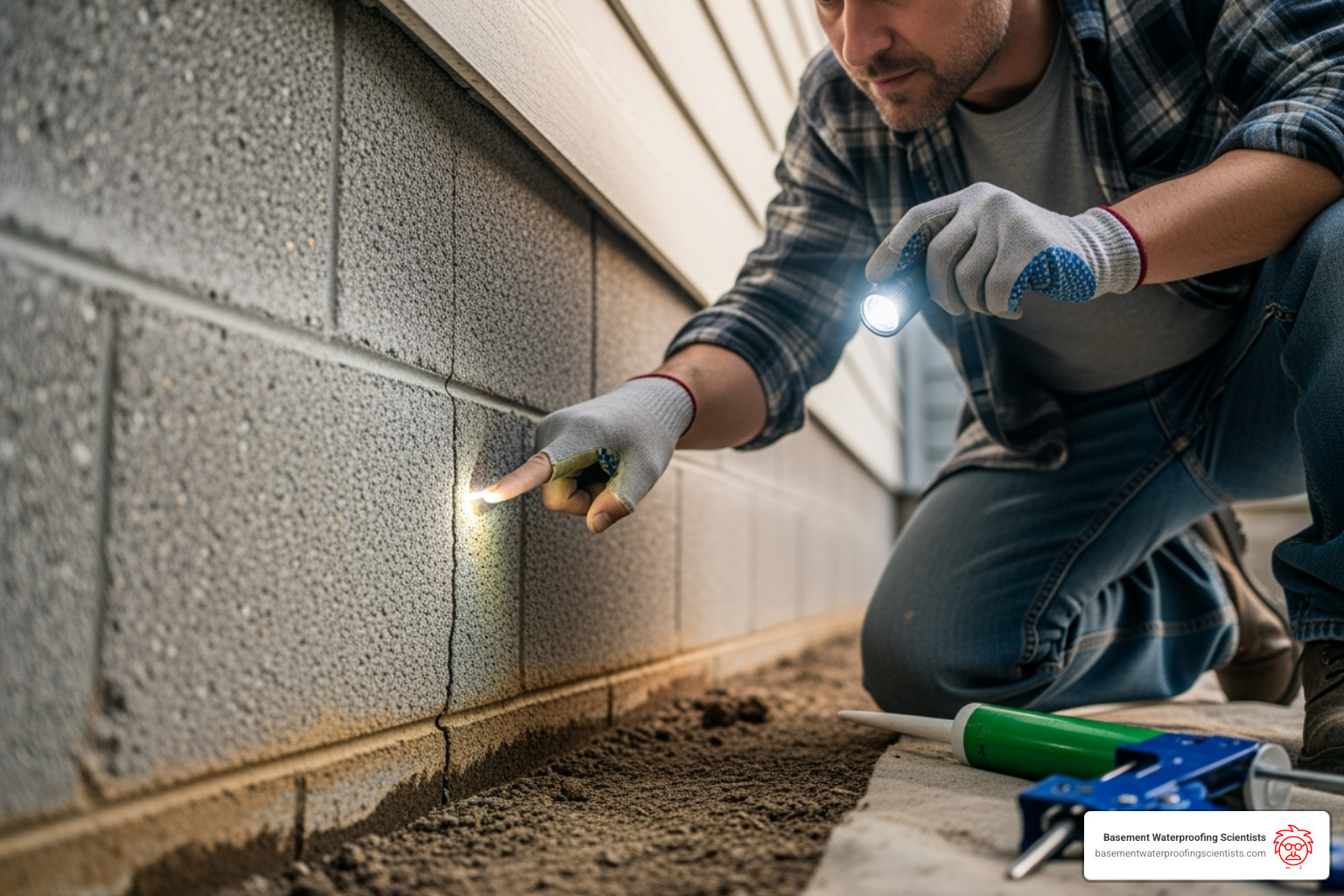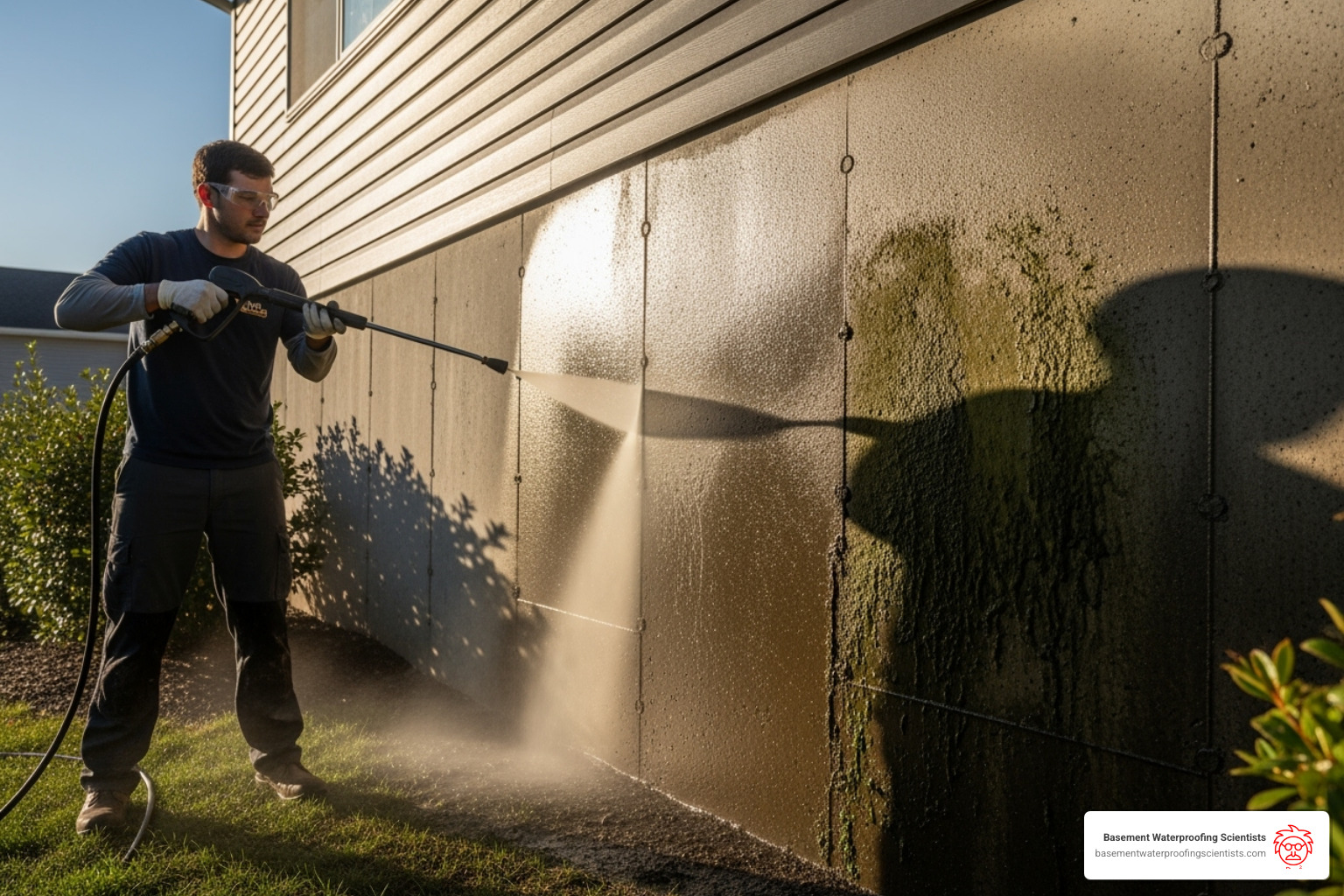Why Foundation Sealing is Critical for Every Homeowner
Choosing the best foundation sealer is crucial when facing basement water issues. It’s the key to a dry, usable space, preventing costly water damage that harms your home’s value and family’s health.
Top Foundation Sealers by Category:
- Best for DIY Projects: Liquid rubber sealants (900% elongation, 7-10 year lifespan)
- Best for New Construction: Bentonite clay (swells 15x, permanent solution)
- Best for Active Cracks: Polyurethane injections (expands 20x, 10-15 year durability)
- Best for Interior Strengthening: Penetrating silicate sealers (permanent, breathable)
- Best Budget Option: Acrylic sealers (3-5 year protection, easy application)
- Best for Foundation Movement: Elastomeric sealants (50% stretch capacity)
Statistics show moisture affects 60% of U.S. homes, with 38% at risk for basement mold. Since water intrusion causes 70% of construction litigation, foundation sealing is essential protection for your investment.
Foundation sealers create a barrier against water penetration. The right one tackles the root cause of leaks, protecting against mold, structural damage, and poor air quality.
Untreated leaks can slash your home’s value by up to 10%. With waterproofing costs averaging $4,000-$8,000, choosing the right sealer upfront is a smart financial move that prevents bigger issues.
I’m Darin Garvey, a basement waterproofing expert with 30 years of experience. My team at Basement Waterproofing Scientists helps homeowners find the best foundation sealer by using specialized equipment to pinpoint leaks and provide targeted, effective solutions.

Understanding Foundation Sealers and Their Importance
Your home’s foundation acts like a sponge. Concrete seems solid, but it’s naturally porous. Microscopic pathways form as concrete cures, creating countless entry points for water.

Hydrostatic pressure is the main culprit. Saturated soil exerts immense force on foundation walls, pushing water through any crack or pore. Once inside, water weakens concrete, rusts rebar, and can cause freeze-thaw cracks. Removing this trapped moisture is nearly impossible.
Damp basements lead to mold and mildew, which are serious health hazards affecting your home’s air quality. Foundation cracks also allow radon gas, a leading cause of lung cancer, to enter your home.
Understanding the difference between basic moisture control and true waterproofing is crucial. Our detailed explanation at Damp-Proofing vs. Waterproofing shows why temporary fixes often fail. For comprehensive background information, you can explore General waterproofing fundamentals.
The best foundation sealer creates a robust barrier that addresses these issues at their source. It’s not just about keeping your basement dry—it’s about protecting your home’s structural integrity, your family’s health, and your property value.
Why Sealing Your Foundation is a Non-Negotiable Home Maintenance Task
Proper foundation sealing is one of the smartest investments you can make in your home. Here are the key benefits:
-
Increased structural integrity: By preventing water infiltration, you protect foundation walls from deterioration and avoid potential settlement issues.
-
Improved indoor air quality: A dry basement prevents the mold and mildew growth responsible for musty smells and health issues.
-
Energy efficiency benefits: A dry, sealed foundation helps maintain stable temperatures, reducing heating and cooling costs.
A Comparative Guide to Foundation Sealer Types
Finding the best foundation sealer means matching the product to your foundation, water issues, and budget. Here’s a breakdown of the six main types to help you make an informed choice.
Liquid Rubber Sealants
Liquid rubber sealants create a seamless, flexible membrane that acts like a durable raincoat for your foundation. They can stretch up to 900% without breaking, providing incredible flexibility. Many are DIY-friendly, eco-friendly, and non-toxic. Originally designed for industrial use, they offer professional-grade protection with warranties up to 10 years. Most are not UV-resistant, making them best for poured concrete and CMUs that will be backfilled.
Bentonite Clay Waterproofing
Bentonite clay is a natural material with a unique property: it swells up to 15 times its original size when it contacts water. This expansion creates a self-sealing, permanent barrier that can last over 20 years. As a natural, eco-friendly material, it’s best for new construction where it can be applied before backfilling. For existing homes, it requires extensive excavation, making it a more invasive and costly option.
Elastomeric Sealants
Elastomeric sealants are highly flexible, stretching up to 50% to bridge hairline cracks (up to 1/16 inch) while maintaining their seal. They are designed to move with your foundation as it settles or shifts with temperature changes. Offering 7-10 years of protection and excellent weather resistance, they are ideal for foundations with minor movement where a rigid sealer might fail.
Penetrating Sealers (Silicates & Siliconates)
Penetrating sealers work differently by diving up to 4 inches into the concrete. They create a chemical reaction that doesn’t just coat the surface but becomes a permanent seal within the concrete itself. This integrated barrier can’t peel or wear away. It’s also breathable, allowing moisture vapor to escape while blocking liquid water. These sealers are effective at reducing radon gas and are often zero-VOC, making them best for interior applications and pre-sealing.
Acrylic Sealants
Acrylic sealants are a straightforward, budget-friendly option. They are affordable, easy to apply, and quick-drying, making them a practical choice for minor moisture issues. Offering moderate flexibility and 3-5 years of protection, they can be painted once cured. They are not designed for significant water pressure or structural movement, making them best for above-grade foundation areas or minor dampness.
Polyurethane Sealants
For active leaks and problem joints, polyurethane sealants are a heavy-duty solution. They offer superior adhesion and can be injected into cracks, where they expand up to 20 times their original size to completely fill voids. This makes them extremely effective at stopping active leaks. With a lifespan of 10-15 years or more, they are best for active leaks and sealing joints where other products might fail.
The Ultimate Guide to Finding the Best Foundation Sealer for Your Needs
Choosing a sealer requires a thoughtful approach to your home’s unique situation. This guide will walk you through the critical decision-making factors.

What to Look for When Choosing the Best Foundation Sealer
Choosing the best foundation sealer requires understanding your foundation’s specific needs. Here’s what to consider:
- Durability: Look for a long-lasting solution. Quality sealers last 5-10 years, while some, like penetrating silicates, can last for the life of the structure.
- Flexibility and Elongation: Your foundation moves. A good sealer must stretch to accommodate this movement without breaking.
- Permeability: The sealer should be breathable, allowing water vapor to escape from the concrete to prevent peeling and failure.
- UV Resistance: For any above-ground foundation areas, choose a sealer that can withstand sun exposure without degrading.
- VOC Content: For interior applications, select a low or zero VOC sealer for better indoor air quality.
- Compatibility: Ensure the sealer is designed for your specific foundation material (poured concrete, block, brick, or stone).
For detailed guidance on exterior applications, check out our comprehensive guide on the Best Exterior Foundation Coating.
Interior vs. Exterior Sealing: Which Method is Superior?
Exterior sealing is almost always the superior method. It stops water at the source, before it can penetrate and damage your foundation walls. This approach protects the structure itself from moisture saturation, freeze-thaw cycles, and deterioration.
However, exterior waterproofing requires significant excavation, which can be disruptive and costly, with average projects ranging from $4,000 to $8,000.
Interior sealing is a secondary barrier. While it can keep your living space dry, it doesn’t stop water from entering the foundation walls, which can lead to hidden damage. Interior solutions are best for managing minor dampness or when combined with other moisture control systems. For persistent leaks, exterior solutions are more effective.
Learn more about comprehensive exterior solutions at our Exterior Foundation Sealing page.
How to Choose the best foundation sealer for Different Foundation Materials
-
Poured Concrete: Prone to hairline and shrinkage cracks. Needs flexible sealers like liquid rubber or elastomeric products. For active cracks, polyurethane injections are best. For older concrete, penetrating silicate sealers create a permanent internal barrier.
-
Concrete Block (CMU): More porous than poured concrete, with many mortar joints. Liquid rubber sealants create a seamless membrane over the entire surface, while certain penetrating sealers can treat both the block and mortar.
-
Brick Foundations: Require breathable sealers to prevent moisture from getting trapped, which can cause surface flaking (spalling). The sealer must effectively treat both the brick and the mortar joints. For detailed guidance, visit our page on Sealing Exterior Brick Foundation.
-
Stone Foundations: The most challenging due to irregular surfaces and mortar quality. Often requires a multi-step approach, including repointing mortar and applying flexible membranes that can bond to uneven surfaces.
Your Step-by-Step Application Guide
Once you’ve chosen the best foundation sealer, proper application is critical. A great product will fail if applied incorrectly. Follow these steps to ensure a long-lasting seal.
Step 1: Preparing the Foundation Wall for Sealing
Preparation is the most important step. A sealer is only as good as the surface it’s applied to. A poorly prepped surface will cause even the best foundation sealer to fail.

- Clean the Surface: Remove all dirt, debris, loose paint, and oil. A pressure washer is effective for exterior walls, while a stiff brush and cleaner work for interior walls.
- Remove Efflorescence: Scrub away any white, chalky mineral deposits with a wire brush and a specialized cleaner to ensure proper bonding.
- Repair Cracks: Fill small cracks (1/8″ to 1/4″) with hydraulic cement, which expands as it cures. Use patching cement for larger damage. Our guide on How to Seal Exterior Foundation Cracks provides detailed instructions.
- Ensure Dryness: The surface must be completely dry. Use a moisture meter or perform a simple touch test. New concrete must cure for at least 28 days. This moisture test guide offers detailed instructions.
Step 2: Applying the Foundation Sealer Correctly
- Read Instructions: Always follow the manufacturer’s specific guidelines for temperature, application methods, and curing times.
- Use the Right Tools: Use a roller, brush, or low-pressure sprayer as recommended for your product. For large areas, back-rolling after spraying ensures even coverage.
- Apply Thin Coats: Multiple thin coats provide better adhesion and a more durable barrier than one thick coat.
- Maintain a Wet Edge: Overlap each new stroke onto the previous wet section to avoid lap marks and create a seamless finish.
- Check Coverage Rates: Calculate how much product you need based on the manufacturer’s specifications (sq. ft. per gallon) and don’t stretch it too thin.
- Respect Curing Times: Allow each coat to dry completely before applying the next. Protect the final coat from rain and dew for 24-48 hours. Apply within the recommended temperature range (typically 50°F to 90°F).
Step 3: Complementary Measures for a Dry Basement
The best foundation sealer works best as part of a complete water management system. Here are other crucial measures:
- Gutters and Downspouts: Keep gutters clean and extend downspouts at least 5-10 feet away from the foundation.
- Exterior Grading: Ensure the ground slopes away from your foundation to direct surface water away from your home.
- French Drains: An exterior French drain can intercept groundwater before it reaches your foundation walls, which is especially effective in areas with high water tables.
- Sump Pumps: An interior drainage system directs any water that enters to a sump pit, where a pump automatically removes it. A battery backup is essential for power outages.
Combining these strategies creates a multi-layered defense for your home. Learn more at our guide on Waterproofing Exterior Foundation Wall.
Frequently Asked Questions about Foundation Sealers
Here are answers to the most common questions I’ve received during 30 years of solving basement water problems.
How long do foundation sealers typically last?
The lifespan of a foundation sealer depends on the product type, application quality, and conditions. Here’s a general guide:
- Acrylics: 3-5 years
- Elastomeric & Liquid Rubber: 7-10 years
- Polyurethane: 10-15+ years
- Bentonite & Penetrating Sealers: Can last the life of the structure.
Proper application is key to maximizing any sealer’s lifespan. For a deeper dive, see our analysis: How Long Does Waterproofing Coating on Concrete Foundation Exterior Last?
Can foundation sealers be applied over existing paint?
The answer is generally no. Most sealers need to bond directly with bare masonry. Applying a sealer over paint traps moisture between the layers, which leads to bubbling, peeling, and failure of both the paint and the new sealer. The best approach is always to remove old paint and start with a clean, bare surface for a long-lasting repair.
What are the most common causes of basement leaks?
Based on our 30 years of experience, here are the most common culprits:
- Hydrostatic Pressure: Water-saturated soil pushing against foundation walls.
- Foundation Cracks: Shrinkage cracks, structural cracks, and cold joints provide easy entry points for water.
- Poorly Sealed Pipe Penetrations: Gaps around water, sewer, or utility lines.
- Failed Window Wells: Improperly drained or uncovered window wells collect water against the foundation.
- Inadequate Exterior Drainage: Clogged gutters, short downspouts, and improper ground slope direct water toward your home.
Our specialized leak detection equipment helps us identify the exact cause, allowing us to recommend targeted solutions that fix the root problem.
Conclusion
Choosing the best foundation sealer means creating a complete defense system for your home. As we’ve covered, different sealers like liquid rubber and bentonite clay offer unique solutions for specific problems. A sealer is one part of a total waterproofing system. Combining it with proper drainage, gutters, and grading provides the most robust protection.
The stakes are high. Moisture affects 60% of U.S. homes, and untreated leaks can reduce property value by 10%. The right sealer protects your home’s structural health and your family’s well-being by preventing mold and improving air quality.
Whether you need an acrylic sealer for minor dampness or polyurethane injection for active leaks, matching the product to the problem is key. Proper preparation and application are what turn a temporary fix into a long-term solution.
For a professional diagnosis and a guaranteed solution to your basement water problems, the experts at Basement Waterproofing Scientists use specialized equipment to find and fix leaks permanently. With 30 years of experience serving homeowners throughout Pennsylvania, New Jersey, and Delaware, we provide targeted repairs backed by a lifetime guarantee and competitive pricing. Considering average waterproofing costs run $4,000 to $8,000, our precise approach can save you money.
Don’t let your basement be a source of worry. Protect your foundation today and take the first step toward a permanently dry, healthy home.

